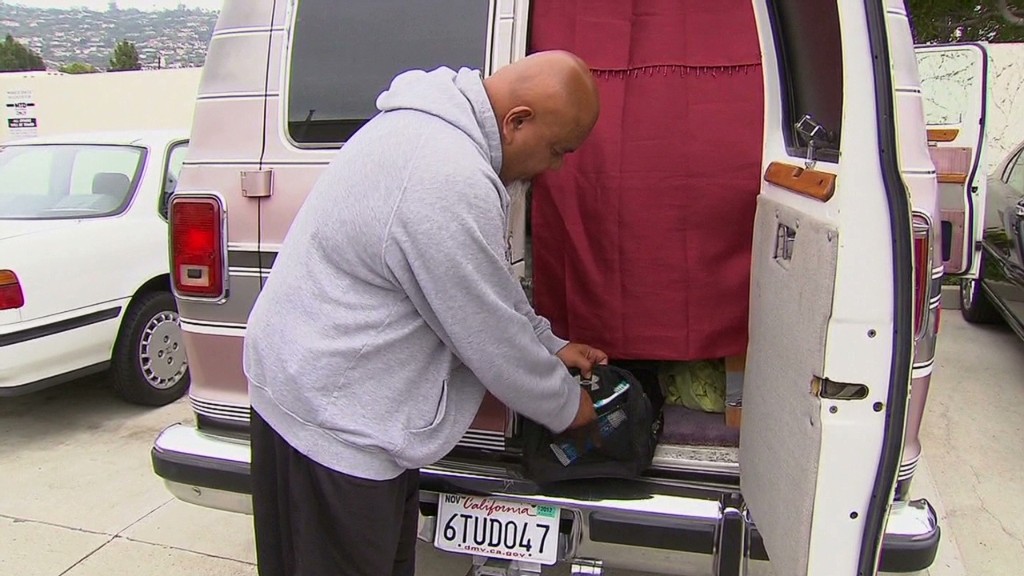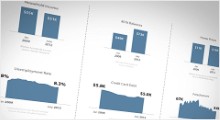
Middle-class families continued to suffer in the aftermath of the Great Recession, and the poverty rate fell slightly, according to U.S. Census Bureau data released Wednesday.
Median household income fell to $50,054 in 2011, down 1.5% from a year earlier. Income inequality widened, as the highest income echelon experienced a jump, while those in the middle saw incomes shrink.
Meanwhile, the national poverty rate eased to 15.0% in 2011, down slightly from 15.1% the year before. Some 46.2 million people fell below the poverty line last year, and one in five children were poor.
The poverty threshold for a family of four was $23,021.
Most experts were expecting an increase in poverty, but Census officials said a rise in the number of people working full time helped keep the rate in check.
Income inequality widens
Over the past year, the rich got richer, though the poor didn't get poorer. And those in the middle were pinched hard.
The top 1% saw their income grow by 6% in 2011, while the highest quintile of earners gained 1.6%, according to Census. But the middle 60% of Americans lost ground, falling between 1.6% and 1.9%. The poorest Americans did not see a significant change.
"A lot of the increase in inequality from 2010 to 2011 is driven by changes at the very top of the distribution," said David Johnson, chief of Census' social, economic, and housing statistics division.
The second and third quintile of Americans now take home only 23.8% of the nation's income, the lowest since the Johnson administration, said Tim Smeeding, the director for the Institute for Research on Poverty at the University of Wisconsin-Madison.
"The big story is the squeeze in the middle- and lower-middle classes," he said. "They got whacked."
Some groups were hit harder than others. Those ages 35 to 44 and 55 to 64 had a drop in income, as did white and black Americans. Households in the West experienced a 4.1% decline in income.
Overall, median income has fallen 8.9% from its peak in 1999. And it's fallen 8.1% since 2007, just before the Great Recession began.
Since the recession, incomes continued to fall, declining 4.1%. Though incomes dipped after the two preceding downturns, this drop is far worse, said Rakesh Kochhar, associate director for research, Pew Hispanic Center.
Related: Breaking the cycle of poverty
The number of men working full time, year-round increased by 1.7 million between 2010 and 2011, while the number of women rose by half a million.
This jump in people holding down full-time jobs may be the reason why poverty remained essentially the same. The number of workers in the lowest income group holding down full-time jobs soared 17.3% in 2011.
In the south, for instance, there were 1.23 million more people working last year, while the number of people in poverty fell by around 740,000.
Hispanics were the only race to experience a decline in poverty, which fell to 25.3%, down from 26.5% a year earlier. Non-citizens saw a 2.5% decline in poverty.
Suburban poverty also fell, the Census Bureau said. Thanks to an additional 1.5 million suburbanites finding full-time jobs, some 740,000 folks there were lifted out of poverty.
But the poverty rate does not truly reflect the condition of poor Americans because it does not take into account roughly $900 billion in government assistance, said Robert Rector, a senior research fellow at the Heritage Foundation, a conservative group.
"The entire welfare state is off the books," he said, noting that the nation hasn't made any progress in enabling Americans to become self-sufficient since the War on Poverty began under Johnson.
Related: Getting off government assistance
Poverty and income inequality have been in the spotlight during the 2012 election. Democrats are positioning themselves as the defenders of the middle class, while casting Republicans as caring only about the rich.
Republicans are looking to overhaul several safety net programs, including turning Medicaid and food stamps into block grants in hopes of relieving the federal government's fiscal burden. Mitt Romney, meanwhile, is trying to paint President Obama as the entitlement president. The Republican presidential candidate is accusing Obama of trying to dismantle the welfare-to-work system by allowing recipients to avoid the employment requirement.



